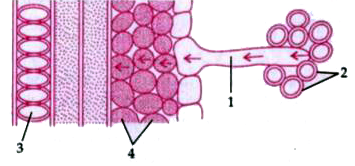The droplets are seen at the end of veins on the grass blades in early morning hours. What is it called?
Step-by-Step Solution:
1. Identify the Phenomenon: The droplets seen at the end of veins on grass blades in the early morning are a specific physiological phenomenon in plants.
2. Name the Process: This phenomenon is called guttation.
3. Understand the Conditions for Guttation: Guttation occurs under certain conditions:
- When the soil is flooded with rainwater.
- When there is high humidity in the air.
4. Explain the Mechanism:
- The excess water in the soil creates hydrostatic pressure.
- This pressure causes the roots to take up more water.
- As water is absorbed by the roots, it is forced upwards through the plant.
5. Water Movement and Stomata:
- The water, along with soluble cell components, moves through the xylem.
- Eventually, this water reaches the stomata (tiny openings on the leaf surface).
- Due to the root pressure and the excess water, the liquid is forced out through the stomata.
6. Final Observation: The result of this process is the visible droplets of water at the tips of the grass blades in the early morning, which is a clear indication of guttation.
---
- When the soil is flooded with rainwater.
- When there is high humidity in the air.
- The excess water in the soil creates hydrostatic pressure.
- This pressure causes the roots to take up more water.
- As water is absorbed by the roots, it is forced upwards through the plant.
- The water, along with soluble cell components, moves through the xylem.
- Eventually, this water reaches the stomata (tiny openings on the leaf surface).
- Due to the root pressure and the excess water, the liquid is forced out through the stomata.
Topper's Solved these Questions
- TRANSPORT IN PLANTS BOOK - ICSECHAPTER - TRANSPORT IN PLANTS EXERCISE - REVIEW QUESTIONS (Short answer type questions)
25 Videos
- TRANSPORT IN PLANTS BOOK - ICSECHAPTER - TRANSPORT IN PLANTS EXERCISE - REVIEW QUESTIONS (Long answer type questions)
16 Videos
- TRANSPORT IN PLANTS BOOK - ICSECHAPTER - TRANSPORT IN PLANTS EXERCISE - REVIEW QUESTIONS (Differentiate between the following)
12 Videos
- THE LIVING WORLD BOOK - ICSECHAPTER - THE LIVING WORLD EXERCISE - Ncert Exercises (Differentiate Between )
4 Videos
Similar Questions
Excess water collects in the form of droplets around special openings of veins near the tip of grass blades and leaves of many herbaceous parts. Such water loss is known as
A. guttation
B. nutation
C. excretion
D. secretion
View SolutionThe figure given below is a diagrammatic representation of a part of the cross section of the root in the root hair zone. Study the same and then answer the questions that follow :

Due to an excess of this pressure sometimes drops of water are found along the leaf margins of some plants especially in the early mornings. What is the phenomenon called ?
View Solution
Knowledge Check
If a soft stemmed plant is cut horizontally near the base of its stem with a sharp blade on early morning of a humid day, drops of solution ooze through cut stem. This is due to
AguttationBbleedingCtranspiration pullDroot pressure.The formula d = rt is called the distance formula. In this formula, drepresents the distance traveled, r represents the rate of speed, and t represents the time traveled. If a person travels 90 miles in 212 hours, what is the value of r?
A36 mphB45 mphC72 mphD180 mphWhat occurs at the end of "The Story of an Hour"?
ALouise mallard falls down the stairs.BMr. Mallard returns home.CLouise mallard revels in her room.DJosephine reveals that she lied.
Water drops present on leaf margins of Tropaeolum, Balsam and grasses in early morning are due to
View SolutionLoss of water in the form of liquid droplets around special openings of veins near the tip of grass blades is called
View SolutionLoss of water in the form of liquid droplets near the tip of grass blades is called
View Solutionthe process responsible for facilitating loss of water in liquid form from the tip of grass blades at night and in early morning is:
View SolutionIn grasses, certain (A)___ epidermal cells along the veins modify themselves into large, empty, colourless cells. These cells are called (B)_____ cells.
View Solution